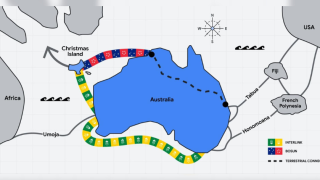On a zig-zag career
Speaking at the 2024 Women of Silicon Roundabout event at London’s ExCel, Ericsson CEO of UK and Ireland, Katherine Ainley says: “I always describe my career as a bit of a zigzag.
“I never set out to go into telecoms, or even into tech for that matter. When people ask if it was all part of a grand plan, the honest answer is, not really.”
Growing up in the Northwest of England, Ainley studied Politics and Government Science at the London School of Economics (LSE), an untraditional route into the telecoms sector, which she refers to as an “advantage".
“It allows you to approach things from a different perspective,” she states. Telecoms touch everyone, after all, most people here likely own a mobile phone. Understanding how government, the economy, and customer priorities influence the sector is just as critical as understanding the technology itself.”
Her career began in consulting and banking before being invited to join BT during a pivotal transformation period.
“That is probably a turning point for me,” she reflects.
“BT shifted to become a more customer-focused organisation. I spend 13 years there in various roles before joining Ericsson to lead the UK and Ireland business nearly four years ago. It’s been a brilliant journey — I absolutely love the telecoms and tech sector, even if my path into it was non-traditional.”
Navigating a male-dominated industry
Meanwhile, Ericsson UK&I’s CEO emphasises the importance of having supportive mentors and sponsors.
“Interestingly, men with daughters are often particularly supportive of women in the workforce,” she observes. “For me, having fantastic bosses who believe in my potential has made all the difference.”
However, she also acknowledges the unique challenges she faced over her career.
“It’s funny, I don’t always notice it until I attend events like this [WOSR 2024] and realise, wow, there really are a lot of men.”
Subscribe today for free
Gender disparity in telecoms
Ainley also addresses the ongoing gender disparity in the telecommunications and tech industries, which she claims remains a significant challenge.
“It’s not great. In telecommunications, for instance, women make up less than 20%, and in tech broadly, it’s around 25%,” she explains. “The root issue is historical — STEM fields haven’t always been welcoming. Despite the sector being exciting and vital, it’s not always perceived as appealing.
As a result, she breaks the issue down into three critical stages.
“First, there’s early interest in STEM. Only 25-30% of STEM students are women, and in telecom-specific fields, it’s often below 20%. Inspiring girls early is crucial. Then, retention and promotion are key.
“Mentorship, sponsorship, and fostering inclusivity are essential to keeping women in the field and advancing their careers. Finally, life transitions like maternity leave, caregiving, or shifting to part-time roles often lead to the loss of talented women.”
She also highlights the importance of role models, stating, “without visible examples, women may not even consider telecom or tech as career options. Seeing women in leadership roles helps break down barriers and shows the next generation that these careers are achievable for them.”
Empathy in leadership and finding the right style
Echoing a theme discussed earlier in the day, Ainley highlights the importance of empathy in leadership, especially in the context of AI and technology.
She states: “These advancements take over mundane or dangerous tasks, allowing people to focus on what they’re really skilled at. At Ericsson, for instance, we use remote trainers for tower inspections, enhancing both efficiency and safety.”
Meanwhile, balancing assertiveness and humility is a challenge the Ericsson boss learned to navigate.
She says: “Early on, people tell me to be more assertive, and then to ease off. Over time, I got better at reading the room and adjusting my approach.
“Gravitas isn’t about speaking the loudest, it’s about knowing when to listen and when to share your perspective,” she states.
Advice for women aspiring to be leaders
For women seeking to rise in the tech and telecom industries, Ainley stresses the importance of evaluating organisational culture.
“Does the company genuinely value diversity and inclusion? Leadership sets the tone. For example, our group CEO is deeply passionate about inclusion and that commitment filters down through the organisation.”
However, building a strong support network and participating in mentorship programs are also crucial.
“Bite-sized learning, leadership courses and buddy systems build confidence. Ultimately, choose environments that align with your values and support your growth,” she concludes.





